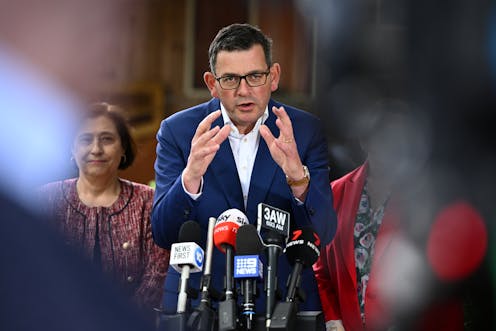
The Victorian state election is today. There are 88 single-member lower house seats with members elected by preferential voting, and 40 upper house seats in eight five-member electorates. The election in the lower house seat of Narracan has been postponed owing to a candidate’s death.
The final Victorian pre-election Newspoll, conducted November 21-24 from a sample of 1,226, gave Labor a 54.5-45.5 lead, a 0.5-point gain for Labor since the last Newspoll three weeks ago. Primary votes were 38% Labor (up one), 35% Coalition (down two), 12% Greens (down one) and 15% for all Others (up two).
48% were dissatisfied with Labor Premier Daniel Andrews (up four) and 46% were satisfied (down five), for a net approval of -2, down nine points. But Liberal leader Matthew Guy’s net approval was also down five points to -25. Andrews led as better premier by 51-35 (52-33 three weeks ago). Newspoll figures are from The Poll Bludger.
The two party estimate in this Newspoll was calculated using respondent allocated preferences. The Others component of this poll likely contains many anti-Andrews voters, but Guy’s ratings are far worse.
A 54.5-45.5 two party split would give Labor a lower house majority in the Victorian parliament. But with their primary vote down 5% from the 2018 election, they would be likely to lose more upper house seats than if the upper house voting system had been reformed.
Redbridge below is predicting Labor will slide into minority government, but this is not based on recent polling. All polls conducted in the last ten days give Labor between 53% and 55% two party, enough for a clear lower house majority.
There is some evidence federal Labor’s honeymoon is waning. The latest federal Morgan weekly poll, from polling conducted November 14-20, had Labor’s lead at 53.5-46.5 for the third successive week, down from 55.5-44.5 previously. This makes it more likely the Victorian Coalition will do well at the state election.
Redbridge pessimistic for Labor, Morgan optimistic
The Poll Bludger reported Thursday on an article in The Herald Sun, in which pollster Redbridge Group said they believe “Labor will be reduced to minority government with 43 seats out of 88”, although a best case scenario for Labor would give them 48 seats.
This opinion is not based on any recent fieldwork, but on “extensive polling and hundreds of focus groups in key seats across the state over the past two years”. The last Redbridge Victorian state poll was conducted in early November, and gave Labor a 53.5-46.5 lead, enough for a clear win in the lower house.
A Victorian Morgan state SMS poll, conducted November 22-23 from a sample of 1,195, gave Labor a 55-45 lead, a two-point gain for the Coalition since a Morgan poll a fortnight ago. Primary votes were 38% Labor (down two), 32.5% Coalition (up 3.5), 12.5% Greens (up one), 4.5% teal independents (steady) and 12.5% for all Others (down two).
Andrews had a 57.5-42.5 approval rating (58.5-41.5 last fortnight). Andrews led Guy as better premier by 65-35 (65.5-34.5 last fortnight).
If Morgan is correct, the 55-45 Labor lead would give them a large lower house majority. But Morgan’s SMS polls have been unreliable, and this poll is skewing to Labor relative to other pollsters.
Vote counting
As at Friday, ABC election analyst Antony Green said 43.4% of all Victorian enrolled voters had voted early in-person, and a further 13.3% had applied for a postal vote. With a likely final turnout of around 90%, that means over 63% have already voted. Early voting has increased since 2018.
The early voting will slow election night counts as early vote centres will likely take until late at night to report their counts. The Poll Bludger said Friday that some postal votes will also be counted on election night. Counting could also be slow owing to the large numbers of candidates.
In the upper house, with eight five-member electorates, a quota is one-sixth of the vote, or 16.7%. It’s probably not safe to call for anyone not elected on quota on election night as small changes in vote share can give a different result under group voting tickets (GVT).
Read more: How Victorian Labor's failure on upper house electoral reform undermines democracy
The ABC will have projections of upper house results using its calculator. But this calculator assumes that all votes are above the line ticket votes. If a party that needs help from other parties’ GVTs is beating a bigger party by a narrow margin, that lead would likely disappear once below the line votes are factored in.
Tasmanian EMRS poll: Liberals well ahead
A Tasmanian state EMRS poll, conducted November 8-15 from a sample of 1,000, gave the Liberals 42% of the vote (up one since August), Labor 29% (down two), the Greens 14% (up one) and all Others 16% (up one), with independents making up 15% of the Others’ 16%. Liberal incumbent Jeremy Rockliff led Labor’s Rebecca White as preferred premier by 46-34 (47-35 in August).
In other Tasmanian news, the lower house of the Tasmanian parliament will be increased from 25 to 35 members at the next election, in five seven-member electorates, from the current five five-member electorates. The lower house had been reduced from 35 to 25 seats in 1998 in an effort to stop the Greens winning seats.
Under the current five-member electorates, the quota for election is one-sixth of the vote or 16.7%. With seven-member electorates, the quota will drop to one-eighth or 12.5%.
Adrian Beaumont does not work for, consult, own shares in or receive funding from any company or organisation that would benefit from this article, and has disclosed no relevant affiliations beyond their academic appointment.
This article was originally published on The Conversation. Read the original article.







